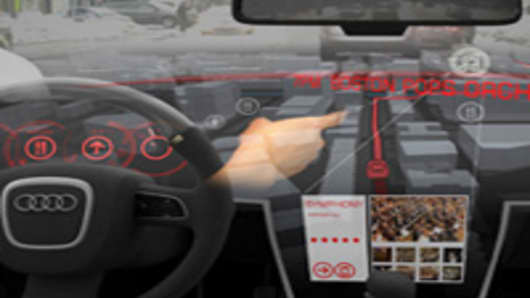Put together two powerful partners — a well-funded consumer-facing company and a top research university, such as MIT – and the stage is set for inventive solutions to real-world problems.
Designing better urban transit systems is one of those problems, andAudi is one of those companies.
Audi of America wants to be involved in conversations about America’s urban future and provide cars that fit into tomorrow’s tech-dominated cities. MIT’s SENSEable City Lab researches how to use data to implement intelligent city transportation.
The project that brought the two together sprung from an unlikely source — the Audi marketing team, including its digital ad agency AKQA. The carmaker wanted to encourage people to admire and buy Audi cars by giving them an online tool with information about their roadways. AKQA acted as matchmaker, discovering that the MIT lab studied exactly the kind of data that the Audi idea needed. The privately held agency then tapped Audi’s existing relationship with the university’s Research Laboratory of Electronics to make the match.
The result is the Audi Road Frustration Index, an entertaining website that launched in beta in mid-September. It tells users at any given hour how the roadways and drivers’ moods in their city rank compared to others nationwide. For instance, Sacramento, Calif., is often as miserable as New York City.
Index findings can tell planners which road segments to improve for the most efficient results. It can also reveal how drivers change their motoring routines when they have more information.
According to the SENSEable City team of Carlo Ratti, Assaf Biderman and Kristian Kloeckl, such partnerships are crucial for planners trying to design cities that marry concrete and steel with silicon and software.
“As of yet we don’t know how to do this,” says Ratti. “But we do know that no single entity in isolation can solve all the issues. It is the integration of the various city actors that breeds success.”
Here’s how the index works. It quantifies the status of traffic jams, accidents and weather in major U.S. cities in actual time, then adds current driver sentiment, based on traffic related posts on Twitter. The information is presented in a map and charts that make comparisons easy.
MIT collects the data and collaborates with AKQA on the infographics and the algorithm that drives the index. As sponsor, Audi pays MIT an annual fee of $300,000-$500,000 and gets its name and an ad on the site. It also helps distribute the index to a wide audience.
The Audi USA website, Facebook page, YouTube channel and an A6 iPad app all link to the index, which can be embedded and shared by users. In addition, the index is a hub for outside Web sites, such as Waze and Roadify, where visitors can find user-generated info about local road hazards, parking spaces and where to leaving your auto behind and take a bus or train.
“As a progressive company, we want to foster research that can make a difference and that we can’t do on our own," says DeLu Jackson, Audi's manager of digital marketing. "This is not like just putting your company’s name on a building."
Tom Bedecarre, CEO of AKQA, says the key to the partnership is the partners’ joint vision. “Both MIT and Audi have a reputation for innovation and a strong emphasis on applied technology,” he notes.
The Road Frustration Index is just the latest of the SENSEable City Lab partnerships. In 2008 it worked with AT&T's Research Labs and the city of New York to discover the economic impact of tourists by studying cellphone activity around a huge city-sponsored art installation. The conclusion? Large-scale art projects bring in twice or three times more money than what they cost to install.
From 2009 to mid-2011, the lab partnered with Waste Management,Qualcomm and Sprint to track where discarded electronic devises ended up. The goal is to improve the e-waste system and encourage the reuse of discarded computers in developing countries.
In general, SENSEable City turns its corporate partnerships into real-world solutions by providing ideas to startups and corporate research and development centers that they can implement. Ratti says the lab can also file patents and license them through MIT's technology licensing office.
As data visualization makes complex research more accessible to the general public, there will likely be more collaboration between universities, government researchers and major advertisers, says Bob Pullum, AKQA group creative director.
“This is especially true with the rise of purely digital communications that can present data in new, more engaging ways,” he says.



